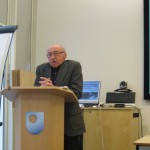What we learnt at ‘What have we learnt?’
 The History of the OU Project was pleased to host a successful one-day forum What have we learnt? Transmitting knowledge, facilitating learning on 29 November. With papers from academics from a variety of traditions this event enabled educationalists, educational technologists, historians and adult education practitioners to gain new perspectives on the OU and the wider development of the HE sector since 1945.
The History of the OU Project was pleased to host a successful one-day forum What have we learnt? Transmitting knowledge, facilitating learning on 29 November. With papers from academics from a variety of traditions this event enabled educationalists, educational technologists, historians and adult education practitioners to gain new perspectives on the OU and the wider development of the HE sector since 1945.
A Senior Research Fellow in IET at the OU, Martyn Cooper, attended the event and swiftly told his colleagues, ‘Today I attended the excellent “What have we learnt? – Transmitting knowledge, facilitating learning c1960-2010” seminar organised by the History of the OU project’. His blog posting is here http://martyncooper.wordpress.com/2011/11/29/what-have-we-learnt-transmitting-knowledge-facilitating-learning-c1960-2010/
After an introduction in which Dan Weinbren proposed that there were three areas in which we would examine change, the experience of adult learners, pedagogic developments and broader political changes since the Second World War, we heard an overview from Professor Malcolm Tight, from University of Lancaster.
He told us that participation in higher education had broadened such that far more women had become students, approximately the same percentage of Black and Ethnic Minorities attended university as there were in the UK but that the percentage of students who came from lower-socio economic backgrounds remained low.
Prof Judith George of the OU told us about the means by which the OU had sought to increase its credibility and reduce the difficulties that its students faced when they were physically isolated and unable to easily access communications technologies. She argued that it had been of value to offer a combination of individual personal time (more than was offered at many other universities) and also what she called ‘industrial scale administration’.
Prof Fred Gray, Sussex University, gave an account of the development of the University of Sussex since 1961. He argued that it was a well-funded campus with an innovative curriculum, provision for the use of television and support for those without conventional academic qualifications. He also noted its nods to convention, illustrated by regalia-wearing men, such as its tutorial system.
The final speaker of the morning session was the OU’s Prof Andy Northedge who gave an illustrated talk on how OU teaching via the television had changed over time, based on a report he has written for the History of the OU project. There had been a shift from teachers’ exposition with students positioned as needing to internalise not problematise the material towards greater support for engagement in meaning making.
In the afternoon Prof Harold Silver, pictured, pointed how little research had been done on the experience of students and noted that although there are many institutions now called universities some of the historical divisions between post-’92 universities and those founded prior to that date remained.
Prof John Beckett from University of Nottingham highlighted both the benefits and difficulties faced by the University of Nottingham when it opened its first overseas campus in Malaysia in 1996 and another campus in Ningbo, China.
Dr Georgina Brewis, Institute of Education, outlined the effects and impacts of students’ involvement in voluntary activities. She drew an important distinction between the history of universities and the history of students, and from whose perspective such histories are written.
Finally, Dr Janet MacDonald, formerly of the OU, drew on her own experience of work with remote students in Scotland in order to assess the impact of distance technologies on learning and teaching.
Dan Weinbren concluded the event by leading a discussion about the formation of a network of those interested in the development of higher education since the Second World War and to discuss a potential bid for a seminar series on this issue to be funded by the AHRC. It was agreed that there were many issues that had arisen during the day that would benefit from further scrutiny.